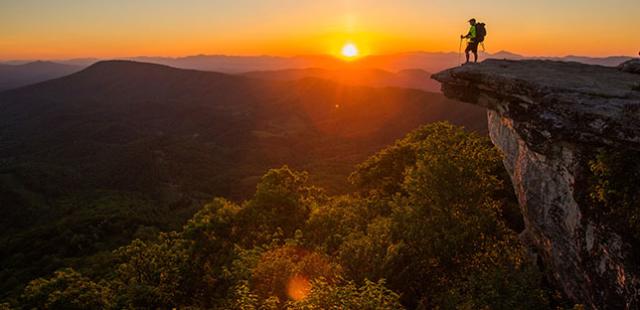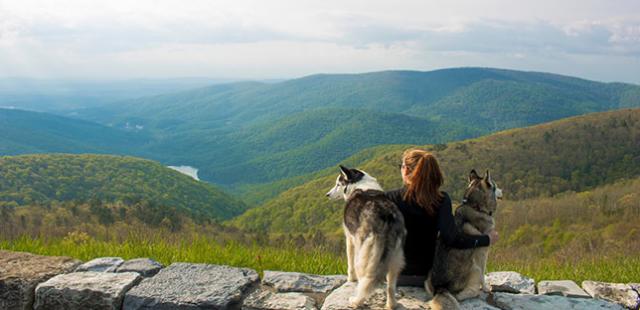Imagine a bumpy, dusty drive that’s taking all day. A tire pops and needs to be patched, then re-patched twice more as a result of the unforgiving heat. It’s a miracle the trio known as the original Carter Family — the married couple of A.P. and Sara Carter plus Sara’s cousin Maybelle — made it the 26 miles from Maces Springs, VA to Bristol that summer day in 1927.
What’s harder to imagine is what the musical landscape would look like had they not made it to Bristol, where Ralph Peer of the Victor Talking Machine Company set up a temporary recording studio. The six tunes the Carters nervously sang into a horn over the course of two days, including “Bury Me Under the Weeping Willow,” “The Wandering Boy,” and “Single Girl, Married Girl,” have proven to be foundational texts for what became known as country music.

Birthplace of Country Music Museum
At Bristol’s Birthplace of Country Music Museum, which celebrates its 10th anniversary in 2024, you’ll find instruments, information, and interactive exhibits on all the budding talents who recorded with Peer in July and August of 1927, including a pre-fame Jimmie Rodgers and established recording artist Ernest Stoneman, who pushed Peer to make the stop in Bristol.
Nevertheless, the Carters are singular in their legacy and lineage. The First Family of Country Music shepherded an underestimated genre from rural hills and hollers into America’s popular consciousness, and the Carter songbook continues to be recorded and performed nearly 100 years later. Sara’s lead vocals paved the way for countless women to step forward in the country realm, and Maybelle’s groundbreaking “scratch” style of guitar combined rhythmic strumming and melodic plucking, vastly expanding the role her instrument could play.
Their immediate impact reached a high point during a 1930s stint performing on Mexican-based border radio station XERA, which blanketed the mainland U.S. with a super-powered signal. They provided comfort and steady companionship to a nation besieged by the Great Depression. Today, you can hear the Carters over the airways without even leaving the Birthplace of Country Music Museum thanks to its in-house radio station, WBCM - LP, which transmits a blend of old-time, bluegrass, Americana, and — of course — country.
The Next Generation

The Carter Family
The Carters’ gig on the border proved to be more than a steady paycheck at a time when their fans had less to spend on records. The next generation of Carters joined in — A.P. and Sara’s children, Janette and Joe, and three of Maybelle’s kids: Anita, Helen, and June — and they got an on-the-job show business education. While the Carters performed and recorded with various combinations and arrangements over the years, the dissolution of A.P. and Sara’s marriage and Sara’s move to California cleared the way for Maybelle and her daughters to take center stage in the 1940s.
Maybelle earned the nickname “Mother” owing to her steady demeanor and generosity toward up-and-coming country acts. The luminaries with whom she and her daughters worked, toured, and lived during the decades that followed are among country music’s all-time greats. The Carters gave harbor to songwriting deity Hank Williams, and Maybelle sewed buttons back on the shirt of a young Elvis Presley when the soon-to-be King was a tourmate. The Carter Sisters and Mother Maybelle partnered with guitar great Chet Atkins early in his career, and they held off on ascending to the Grand Ole Opry stage until Atkins, whose abilities intimidated the Nashville establishment, was permitted to join them at the Mother Church.
The combination of the Carters’ influence and intergenerational legacy is perhaps best personified by Johnny Cash, who fought addiction to win the love of June Carter. Cash was a hard-living hitmaker when his path crossed the Carters. With the First Family of Country as his support system, Cash found sobriety and sustained success, performed with his in-laws frequently, and remained devoted to June from their 1968 marriage until her death in 2003.
The Founding of the Carter Family Fold

The Carter Family Fold
When a group’s influence is this ubiquitous, it can sometimes vanish into the waves of albums and artists that follow. Thankfully, in 1974, Janette Carter founded the Carter Family Fold, the premier stop along The Crooked Road, Virginia’s 330-mile music heritage trail.
So much Carter Family history converges there in Hiltons — at the foot of the same Clinch Mountain the group immortalized in song. Visitors are invited to step into the restored and relocated cabin where A.P. was born. You’ll even find a favorite rocking chair of Johnny Cash’s there. Just steps away, in the building A.P. operated as a general store, you’ll find a museum with photos, instruments, show clothes, and other ephemera from the Carter Family’s rise to prominence.

Carter Fold Festival
But the Fold’s beating heart is an 800-seat, shed-style music venue that hosts traditional music and dancing every Saturday night from February to November. Countless storied performers have graced the stage, from Marty Stuart to Johnny Cash himself, and special concerts are scheduled for 2024 to commemorate the Fold turning 50. They’ll host a special Appalachia Rising show on Saturday, April 27th, featuring the bluegrass of Volume Five and Lonesome River Band, and a 50th anniversary installment of the annual Carter Family Memorial Festival on Saturday, Aug. 3rd.
A Living Legacy
If you keep an ear out during this year of anniversaries, you’ll hear the music the Carter Family performed and inspired drifting throughout Southwest Virginia.
It’s heard from informal singalongs on porches to the midday old-time exhibitions hosted by the Blue Ridge Music Center each day the scenic museum and venue is open. Located at Milepost 213 on The Blue Ridge Parkway, the center is also home to the Roots of American Music Museum and a Saturday evening concert series from Memorial Day through Labor Day.

Floyd Country Store
Old-time music comes to life with special, move-your-feet energy at the storied Floyd Country Store during Saturday Americana shows, Sunday mountain music jams, and the long-running Friday night jamborees — themselves celebrating a 40th anniversary this year. It’s an unforgettable scene, with visitors of all ages flatfooting, Homestead Creamery ice cream being scooped, and instruments hanging for sale.
The innovative legacy of Mother Maybelle’s scratch is on fiery display during the Old Fiddler’s Convention, held each summer in Galax, and the Wayne C. Henderson Music Festival and Guitar Competition, hosted each June in Mouth of Wilson, Virginia. The first-place picker at Henderson’s event is awarded a guitar made by the festival’s namesake, whose craftsmanship was chronicled in the 2005 book, “Clapton's Guitar: Watching Wayne Henderson Build the Perfect Instrument.”

Southwest Virginia Cultural Center & Marketplace
You can pick up your copy of “Clapton’s Guitar” at the Southwest Virginia Cultural Center & Marketplace in Abingdon, which acts as a gateway for the Crooked Road. There’s an open jam there on the first Thursday of every month — no competition ribbons required. Similar jams are held regularly at the Blue Ridge Institute & Museum in Ferrum, as well as various breweries and distilleries around the region, including Axe Handle Distilling in Lee County. There’s even a weekly jam held on Mondays in Marion at the Wayne C. Henderson School of Appalachian Arts, where aspiring luthiers can learn to make guitars and fiddles during intensive, week-long programs.
Whether you’re listening, dancing, learning, or making, the countless ways to engage with the Carter Family’s legacy bring to life the promise embedded in the title of their most covered song, “Can the Circle Be Unbroken (By and By)” — just head for the Crooked Road and you’ll be right in the middle of it.

